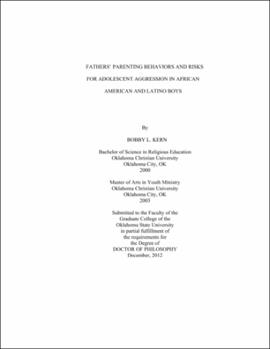| dc.contributor.advisor | Henry, Carolyn S. | |
| dc.contributor.author | Kern, Bobby L. | |
| dc.date.accessioned | 2013-12-10T18:04:20Z | |
| dc.date.available | 2013-12-10T18:04:20Z | |
| dc.date.issued | 2012-12 | |
| dc.identifier.uri | https://hdl.handle.net/11244/7706 | |
| dc.description.abstract | Scope and Method of Study: Guided by ecological resilience perspectives this study examined the association between various risk factors (neighborhood risk, discrimination, peer victimization, fathers' risk behaviors) and African American and Latino adolescent boys' physical and relational aggression. Fathers' parenting behaviors were examined primarily as mediators and moderators of those associations to determine how they might exacerbate or protect against those risks. Both adolescents and their fathers reported on fathers' parenting behaviors. Data were collected from 234 adolescents (mean age of 15.17, 34.2% African American, 65.8% Latino) and their fathers. Structural equation modeling was used to test two aspects of a theoretical model that from which two research questions evolved. The first model posited that (a) risks would be positively associated with boys' aggression, and (b) fathers' parenting behaviors would mediate the associations between risk factors and aggression. The second model posited that (a) victimization would be positively associated with boys' aggression and (b) fathers' parenting behaviors would mediate the associations between risk factors and aggression. | |
| dc.description.abstract | Findings and Conclusions: In the model examining the relation of neighborhood risk and fathers' risk behaviors with adolescent boys' aggression, adolescents' reports of fathers' support mediated the relation between neighborhood risk and relational aggression for African American boys, but fathers' monitoring mediated the relation between fathers' risk behavior and physical aggression for Latino boys. In the model examining discrimination and peer victimization, adolescents' perceptions of fathers' monitoring emerged as a protective factor of physical and relational aggression at low levels of peer victimization but not high while fathers' self-reports of support emerged as a protective factor against relational aggression at low levels of peer victimization but not high. Future research can focus on these two racial/ethnic groups to better understand the role that fathers' parenting behaviors play as either risk or protector. Intervention programs should emphasize and encourage fathers' support as opposed to monitoring in the presence of higher risk factors. Programs should involve fathers and sons together and emphasize open communication between the pair. | |
| dc.format | application/pdf | |
| dc.language | en_US | |
| dc.rights | Copyright is held by the author who has granted the Oklahoma State University Library the non-exclusive right to share this material in its institutional repository. Contact Digital Library Services at lib-dls@okstate.edu or 405-744-9161 for the permission policy on the use, reproduction or distribution of this material. | |
| dc.title | Fathers' parenting behaviors and risks for adolescent aggression in African American and Latino boys | |
| dc.contributor.committeeMember | Harrist, Amanda W. | |
| dc.contributor.committeeMember | Larzelere, Robert E. | |
| dc.contributor.committeeMember | Merten, Michael J. | |
| dc.contributor.committeeMember | Carlozzi, Alfred F. | |
| osu.filename | Kern_okstate_0664D_12371.pdf | |
| osu.accesstype | Open Access | |
| dc.type.genre | Dissertation | |
| dc.type.material | Text | |
| dc.subject.keywords | adolescence | |
| dc.subject.keywords | african american | |
| dc.subject.keywords | aggression | |
| dc.subject.keywords | fathers parenting | |
| dc.subject.keywords | latino | |
| dc.subject.keywords | resilience | |
| thesis.degree.discipline | Human Sciences | |
| thesis.degree.grantor | Oklahoma State University | |
